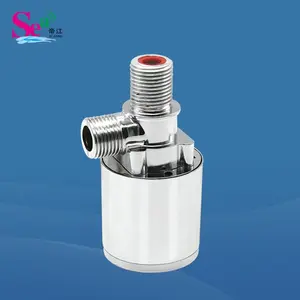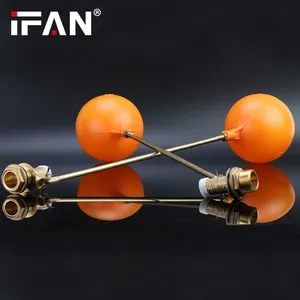
Upper Inlet 1/2' Internally Install Plating Float Ball Valve Cooling Tower Water Level Controller For Fish Tank Irrigation

Ball Valve Electric Actuator PVC Electric Actuator Float Ball Valve Factory True Union Thread 2-way Ball Valve






















Float valves play a crucial role in regulating water flow within a system by opening or closing a valve based on the water level. They are indispensable in various applications that necessitate water level management, such as tanks, cisterns, and water troughs, and are commonly utilized in commercial, residential, agricultural, irrigation, and domestic water supply settings.
The operational concept of float valves is simple yet effective. They comprise a valve mechanism and a float arm linked to the valve's body. As the water level changes, the float arm moves correspondingly. Once the water reaches a specific level, the float arm triggers the valve mechanism to either permit or restrict water flow. This level can be adjusted to maintain a constant water level or as per operational requirements.
Float valves are esteemed for their simplicity and reliability. They function autonomously without external power sources or intricate control systems, making them a cost-efficient water control solution. Moreover, they deliver consistent performance over time with minimal maintenance, which is vital for prolonged system operation.
Various types of float valves are accessible to cater to different applications and preferences. Here are some commonly deployed varieties:
Ball Float Valves: Traditional float valves employing a basic mechanism with a lever and a ball float. They are typically found in toilet tanks and smaller reservoirs requiring automated water level maintenance.
Diaphragm Float Valves: Utilizing a flexible membrane as a barrier, diaphragm float valves are prevalent in industrial processes or locations with fluctuating water levels. They are sturdy and can withstand varying pressures and water qualities.
Pilot-Operated Float Valves: More advanced valves utilized in larger applications like agricultural irrigation or commercial systems. They incorporate a pilot control system that keeps them closed until signaled by the pilot to open.
Plunger Float Valves: Employed in open systems such as pools or ponds, plunger float valves operate with a freely moving plunger inside a pipe to regulate water flow. They are commonly used for automatic filling and draining in pools or ponds.
Opting for the suitable float valve for your business demands a meticulous assessment of several factors to ensure it aligns with your specific requirements. Initially, ascertain the application's needs: whether it is for a residential water tank, an industrial system, or a specialized plant process. This evaluation will aid in selecting the right size and type of float valve.
Material compatibility is critical; for instance, stainless steel or brass may be essential for high-temperature or corrosive environments, while plastic could suffice for less demanding conditions. The valve's structure—screw or ball float—should align with your installation preferences and system design.
Moreover, consider the valve's operating temperature range to verify its resilience to the environmental conditions at the installation site. For high-temperature applications, materials like stainless steel or high-temperature rated plastics may be indispensable.
Lastly, take into account any requisite certifications or standards compliance pertinent to your industry. This may encompass product-specific certifications or broader safety standards that the float valve must adhere to.
For enterprises in search of dependable water control solutions, Alibaba.com emerges as a leading online marketplace offering an extensive array of float valves suitable for diverse applications. With its global reach connecting suppliers with buyers across various industries, Alibaba.com simplifies the procurement process by providing access to a wide range of products in one convenient platform. Whether you seek a standard screw-in type float valve for a water tank or a specialized high-pressure ball float valve for a pressurized system, Alibaba.com offers a comprehensive selection without compromising on quality or reliability.
The platform's commitment to facilitating secure transactions through services like Trade Assurance ensures protection of your investment until delivery completion. Furthermore, with features enabling communication in local languages and mobile-friendly purchasing options, Alibaba.com enhances business efficiency by catering to your specific needs devoid of unnecessary complications.
Alibaba.com prides itself on transcending mere transaction facilitation; it serves as a partner in global trade that supports business expansion. By opting for Alibaba.com for your float valve requisites, you not only gain access to a diverse product range but also leverage a robust system designed to streamline international trade effortlessly.
A float valve is a device utilized to regulate the liquid level in a tank or system. It operates based on buoyancy, with a buoyant element that ascends with the liquid level and is attached to an arm adjusting the valve mechanism with liquid level changes.
Float valves are commonly employed in applications necessitating automated liquid level regulation, such as in water tanks, HVAC systems, chemical storage, and wastewater treatment plants.
The selection of float valve material hinges on the controlled liquid, its temperature, and the presence of corrosive elements. Stainless steel is often favored for its durability and corrosion resistance, rendering it suitable for a broad range of applications.
Indeed, float valves come in diverse designs to cater to various pressure requirements. It is crucial to choose a valve rated for the specific pressure conditions of your system.
Float valves designed for corrosive media typically incorporate materials like stainless steel or specially coated metals to ensure longevity and prevent corrosion or erosion of valve components.
Yes, float valves are available in various sizes to fit different tank dimensions and flow rate requirements. It is essential to select a valve of the appropriate size for your system's demands.
Absolutely, specialized float valves designed for high-temperature applications are accessible, crafted from materials like stainless steel or other metals capable of enduring continuous exposure to hot liquids.
While Alibaba.com does not provide installation services, some suppliers may extend installation assistance or guidance. It is advisable to inquire with individual suppliers on Alibaba.com regarding their policies concerning installation support.
A screw-in type float valve necessitates a threaded connection for attachment to the water tank, whereas a ball float valve operates on a pivot point and is utilized in scenarios where a threaded connection is impractical. Ball float valves typically offer enhanced performance at low and medium pressure ranges.
Float valve maintenance typically encompasses periodic inspections for wear and damage, cleaning to eliminate any debris or mineral deposits impacting its operation, and ensuring that moving parts such as seals and washers are in optimal condition.